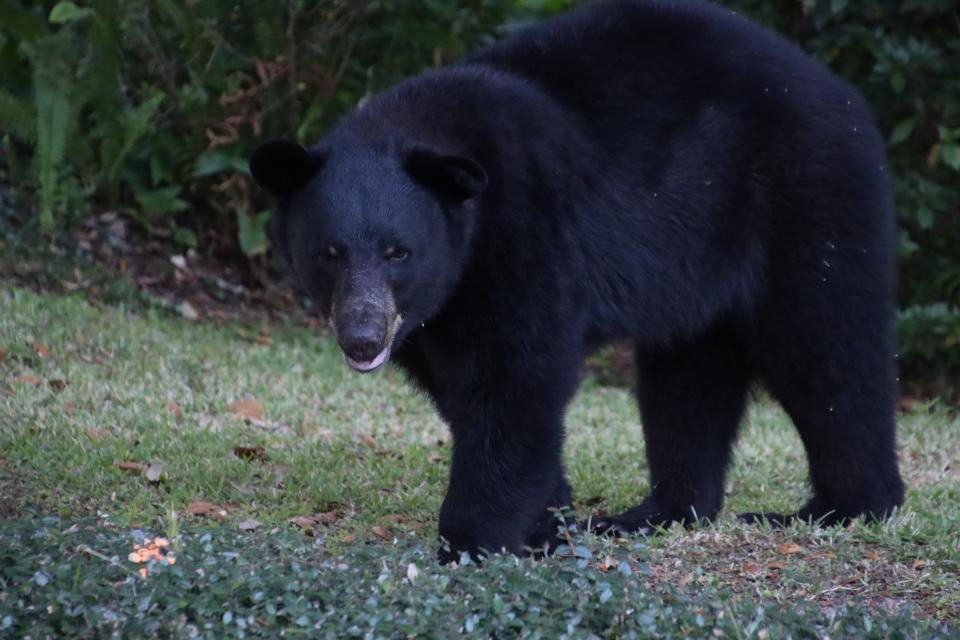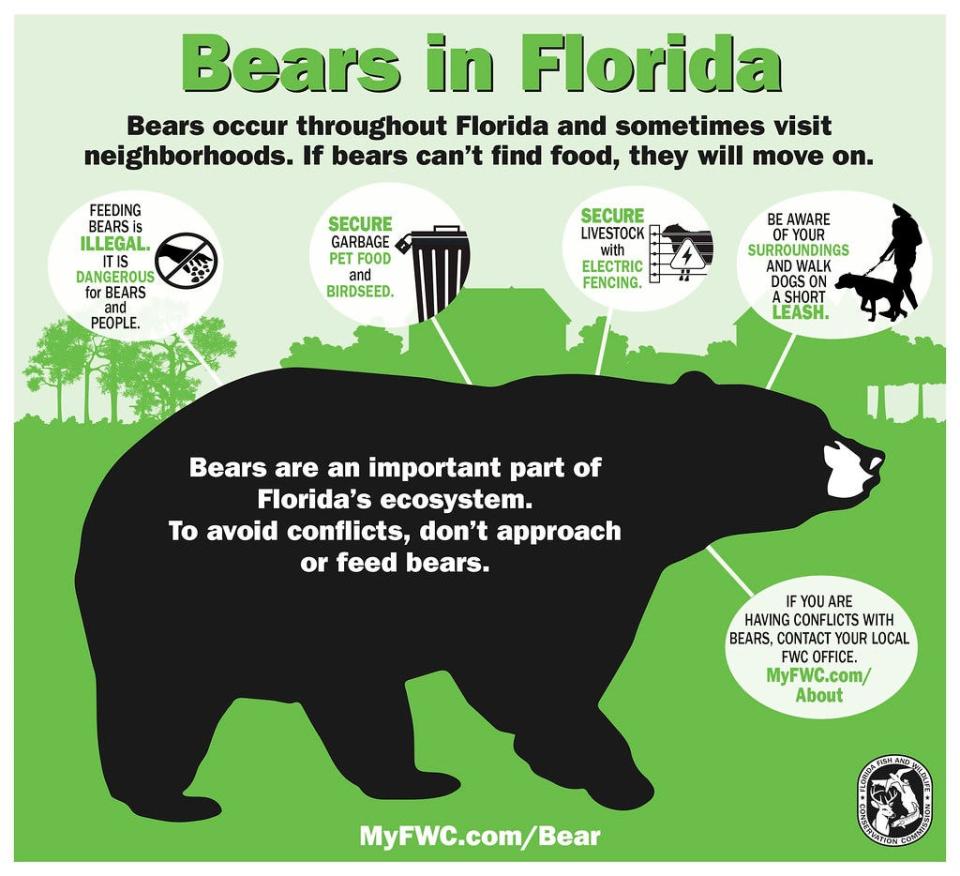Bear safety: What to know to protect you, your family and pets from wandering bears
In the wake of this week’s viral online news of a wandering black bear that caused the closure of roughly half of Walt Disney World’s Magic Kingdom, it’s probably a good time to review safety guidelines about what to do if you encounter a bear in the real-world.
Or in a popular theme park, for that matter.
Here are important facts about black bears in Florida and what to do if you encounter one:
How many bears are there in Florida?
The Florida Fish and Wildlife Conservation Commission estimates there are over 4,000 black bears living in the state.
Here are some other bear facts:
Black bears are the only species of bear found in Florida.
Adult male black bears usually weigh between 250 and 350 pounds. The largest adult male black bear in Florida weighed 760 pounds. Adult female black bears are smaller than males, usually weighing between 130 and 180 pounds. The largest adult female black bear in Florida weighed 460 pounds.
Female bears have their first litter at about 3 ½ years old and generally have a litter every other year.
In Florida, the breeding season runs from June to August and cubs are born around late January or early February.
Bears are excellent climbers and often climb trees when they are frightened. (The Bear at Disney World was spotted in a tree, prompting temporary closure of Frontierland, Liberty Square and Adventureland.)
About 80% of a black bear’s diet comes from plants (fruits, nuts, berries), 15% from insects (termites, ants, yellow jackets) and 5 percent from meat (opossums, armadillos, carrion).
How likely is it that I’ll encounter a bear?
With development in Florida booming and bear habitats fragmenting as a result, the chances of seeing a bear in the wild have risen, experts say.
![Florida black bear. [FILE PHOTO/GATEHOUSE MEDIA]](https://s.yimg.com/ny/api/res/1.2/tmhLHjxDe7FP0tbi3qV89A--/YXBwaWQ9aGlnaGxhbmRlcjt3PTk2MDtoPTY1MQ--/https://media.zenfs.com/en/daytona-beach-news-journal/07c26bdf6be1a59fe9ab758088de578c)
When that includes residential areas, it's important to remember that it’s required by law that you secure garbage and other attractants, which bears can smell from more than a mile away, according to the FWC. Bear attacks, while rare, are possible and usually driven by a bear defending itself, its cubs and/or food sources.
What should I do if I see a bear?
If you encounter a bear at close range, remain standing upright, back up slowly and speak to the bear in a calm, assertive voice, according to the FWC.
Do NOT feed or intentionally attract bears. If a bear eats something on your property, take note of what it is and secure it once the bear leaves.

NEVER approach or surprise a bear. If you see a bear from a distance, enjoy the experience, but do not move toward the bear. If you are close, do not make any sudden or abrupt movements. Back way slowly and be sure the bear has an obvious escape route.
If you are in your yard:
Make sure that you are in a safe area and that the bear has a clear escape route. Then, make noise or bang pots and pans to scare the bear away.
Do NOT turn your back, play dead, climb a tree or run. Back away slowly into the house or secure area.
Avoid direct eye contact. Bears and many other animals may view this as aggressive behavior.
Report any bear that is threatening the safety of humans, pets or livestock, or causing property damage to the FWC.
What can I do to keep bears away?
Here are some household routines to follow to keep bears from being attracted to your property:
Secure household garbage in a shed, garage or a wildlife-resistant container such as a bear-resistant container or caddy.
Put household garbage out on morning of pickup rather than the night before.
Secure commercial garbage in bear-resistant dumpsters.
Protect gardens, beehives, compost and livestock with electric fencing.
Encourage your homeowners association or local government to institute ordinances on keeping foods that attract wildlife secure.
Feed pets indoors or bring in dishes after feeding.
Clean grills and store them in a locked, secure place.
Remove wildlife feeders or make them bear-resistant .
Pick ripe fruit from trees and remove fallen fruit from the ground. Bears love fruit.

Keep in mind: Screened enclosures ARE NOT SECURE and WILL NOT keep bears out.
What can I do to keep my pets safe from bears?
Here are some recommendations from the FWC:
Walk pets using non-retractable leashes and carry noisemakers or bear spray. If possible, avoid walking them during nighttime hours or at dusk or dawn when bears are most active.
Before letting pets outside, make noise and flash lights to scare bears or other wildlife.
Use electric fencing around outdoor pens, which should be as far as possible from tree/shrub lines or other covers. Outdoor pens also should have a roof and/or be high enough to keep out wildlife. A skirt that extends outward and underground to prevent digging also is recommended.
For more information on living with bears, visit myfwc.com.
This article originally appeared on The Daytona Beach News-Journal: Bear safety in Florida: What you need to know

